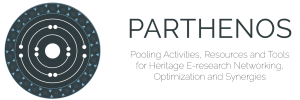
This summer, students at the European Summer Institute in Technology and Culture in Leipzig will have a unique opportunity to learn about the theory and practice of developing digital humanities infrastructure. The course represents the first training materials to be delivered by the PARTHENOS (Pooling Activities Resources and Tools for Heritage eResearch Networking, Optimization and Synergies) project and addresses some of the key skills associated with infrastructures like the PARTHENOS cluster members.
Jennifer Edmond, Co-Director of the TCD Centre for Digital Humanities and Leader of PARTHENOS Work Package 7, says of the course: “Within infrastructure projects, we often focus only on training new users to access and adopt the data and tools within our own environments. What the work of PARTHENOS has revealed, however, is how much deeper we need to go. Infrastructures need first of all to raise awareness of their place in the wider ecosystem, to answer the question of what infrastructures do and how to access them. For this reason, one component of the course, and of later, more widely accessible PARTHENOS materials, will be explaining in plain language what infrastructures like DARIAH, CLARIN, EHRI, CENDARI, ARIADNE and IPERION CH provide, and how they make a difference in an ecosystem crowded with digital projects, initiatives and tools. But at a higher level, we also need to support ‘infrastructural thinking’, sharing the tacit knowledge these projects have developed through their research, application and practice. Further modules in the course will therefore deal with some of the key and specialised skills an infrastructure manager needs, like communicating with non-traditional audiences, developing broad strategies for user engagement, or envisioning a medium to long-term sustainability strategy that works for your particular user base. In addition, in the course we will dig in to the key relationships that shape infrastructure projects – in particular those between collection holding institutions, computer scientists and humanists – as well as looking at some of the macro-level European policy developments affecting infrastructure development in Europe today, like funding, human resource development, Open Science and Open Data, among others.”
The week-long course is being offered from 25-29 July 2016, and has attracted students from around the world and with a wide variety of backgrounds and interests. The course will be convened by Dr Edmond, but will also feature input from many other PARTHENOS colleagues, including guest lectures by Jenny Oltersdorf, Fachhochschule Potsdam, and PARTHENOS Coordinator, Franco Niccolucci from the PIN Scrl.
Over the course of the next few years, PARTHENOS will build upon the framework established with this early milestone to hone the models and messages and to make the lecture content from the ESU course available more widely and for different audiences, for use in future training schools and for adoption by digital humanities courses and degree programmes.
